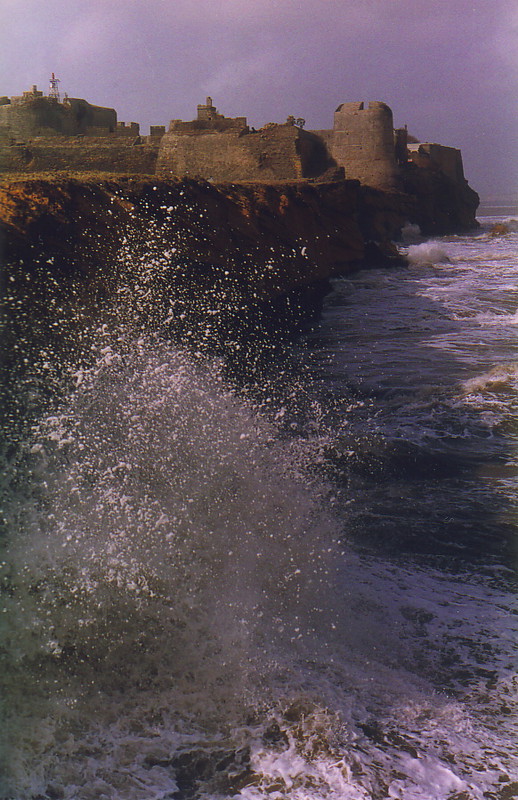
Diu feels like a frontier town; given both its distant and recent history, this is perhaps not surprising. Stuck out on a limb at the southernmost tip of Gujarat, the island of Diu was one of the few Portuguese colonies in India (the others being Goa and Daman). Between the 14th and 16th centuries Diu was an important trading post for the Ottoman Turks, but in 1535 the Portuguese took control on their second attempt, building a huge fort and settling in for a long old occupation. They finally left in 1961 as a result of Operation Vijay1, in which attacks were launched by air and land on the Portuguese territories of Goa, Diu, Daman and the Anjidiv Islands. The operation was a success, and all four territories, including Diu, soon joined the Indian Union.
Diu is not part of Gujarat, however; it's governed from Delhi in a similar way to Pondicherry (they're both Union Territories), and this adds to the feeling of isolation. Not only is Diu geographically out in the sticks, it's culturally different too, most noticeably in the availability of alcohol. Gujarat is a dry state – the only one left, as far as I can make out – but Diu is not only very wet, it's very cheap (Rs30 for a 650 ml bottle of beer is not bad going).
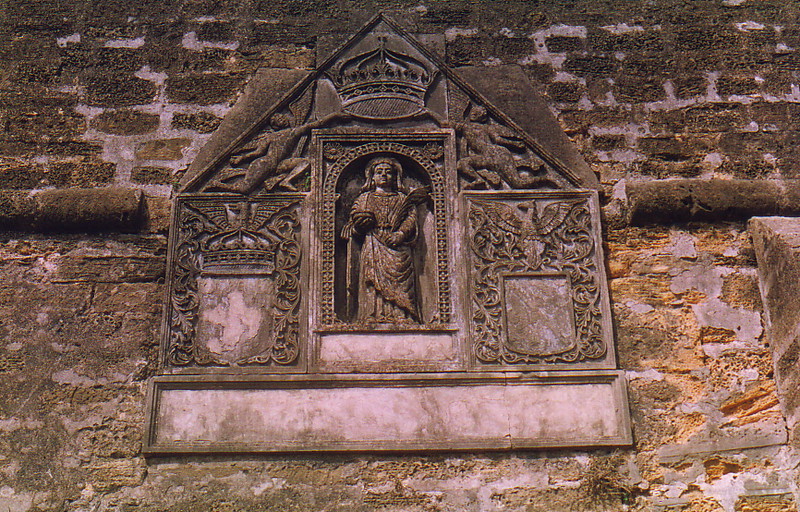
This helps to explain the reaction of the Gujaratis I met on the way from Bhavnagar to Diu; when they found out I was heading for Diu, they asked if I had any drink with me, what was in my water bottle (water, as a matter of fact) and whether I liked to get drunk. Initially it didn't click; 'You go Diu? What is that you drinking?' didn't make any sense until I remembered the lack of alcohol in Gujarat. Then it started to irritate me, because everyone automatically assumed that because I was going to Diu, I must be an alcoholic.
This might be true for Indian visitors to Diu, as inevitably the cheap availability of booze acts as a magnet for Indian drinkers. This only serves to add to the frontier image; wandering into the bars, you're greeted by pairs of blurred brown eyes, tinged deep yellow and hooded by sinking eyelids. At night the sound of drunken Indians singing is only matched by the sound of mangy dogs baying, often because they've been woken from their slumber by a pissed up Gujarati taking out his drunken frustrations on the local wildlife.
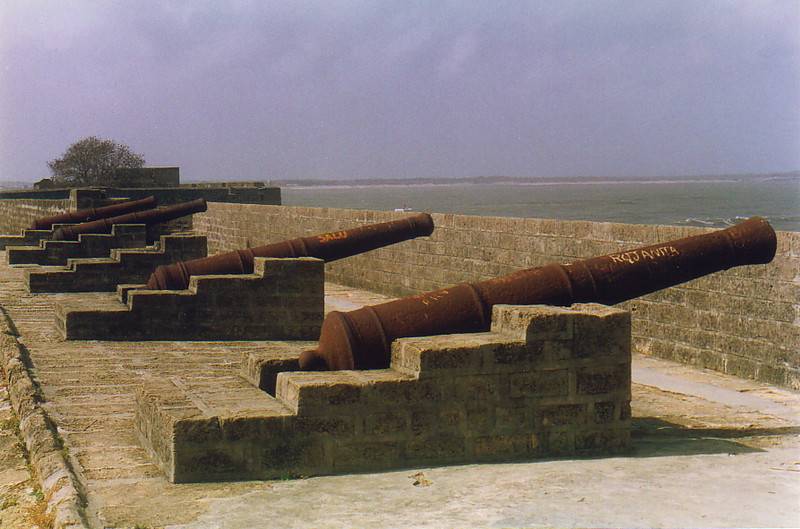
Restaurants open for breakfast are also open to Indians cracking into the local wine at 9am, while packs of westerners sit in the corner, marvelling at the alcoholic tendencies of the Gujaratis while nursing savage hangovers of their own. I even saw a man pass out in his seat at around midday and proceed to piss himself – and this in a fairly respectable place – as well as all manner of alcohol-induced fights; these were the same embarrassing displays of losing control and a desire to get paralytic that I saw in Pondicherry and French Polynesia. Westerners aren't much better, but it still seems that although westerners tend to drink more, they don't typically behave like this, whereas most Indians I see drinking heavily can't resist acting the fool.
Exploring Diu
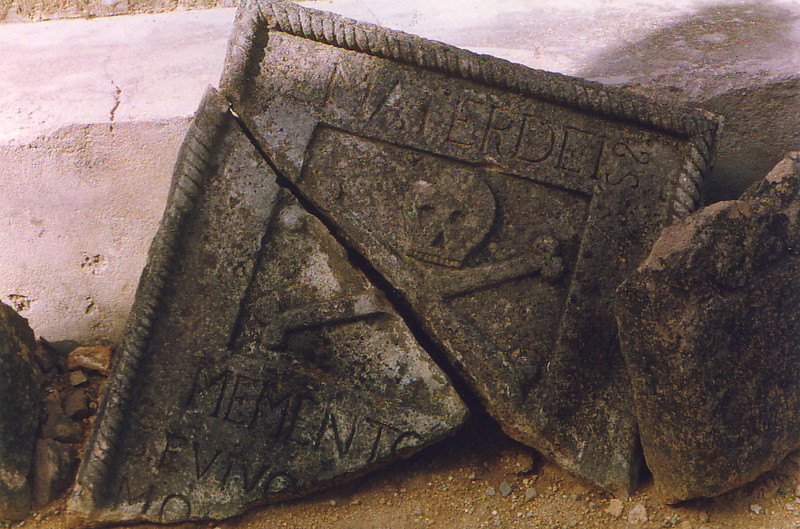
I arrived in this outpost of colonialism and clandestine consumption during the most god-awful storm I'd encountered in India2. The rain drove into the bus, pouring through windows without glass and leaking through rivets in the bus roof, and even my umbrella proved scant protection inside the rattle-trap. Chai shops were flooded out, the whole state suffered from a power cut, and when I arrived in Diu late in the evening I couldn't see a thing. I wondered what on earth I'd stumbled into.
Actually I'd stumbled into a wonderful oasis of beaches, colonial buildings and cheap alcohol, and although the latter was an attraction and made for some interesting late nights back at the hotel, I found the buildings to be the most interesting part. The beaches on Diu are pretty reasonable, but with all the terrible weather and the monsoon approaching, the sea was churning brown and totally unsuitable for swimming, and even if I had fancied a bit of sunbathing, then I'd have had to put up with the locals, as to the Indians, western sunbathers are like television: they're worth staring at for hours. If you want beach privacy, avoid India and go to Thailand.
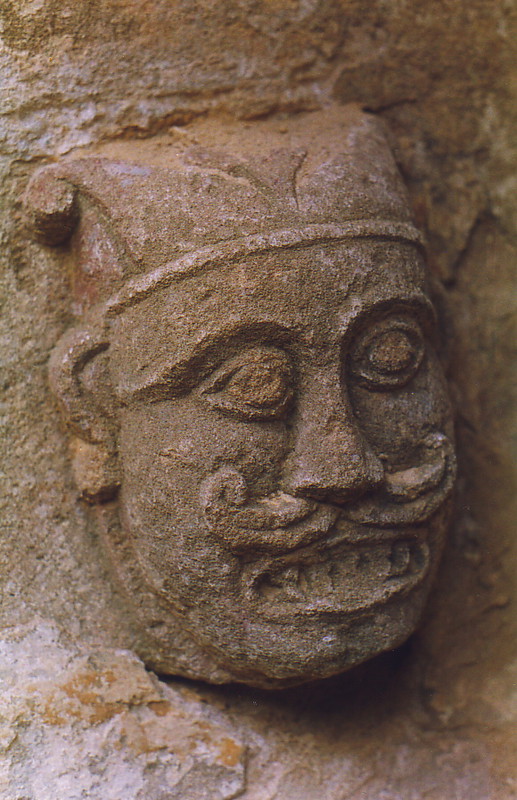
The fortress, easily the most impressive Portuguese building in Diu, is perfect frontier material. Surrounded on three sides by severe cliffs falling into the sea and sheer walls built to withstand the biggest army the Gujaratis could muster, the earliest parts date from 1535, with a lot of the building being done between 1546 and 1650. These days it's uncomplainingly slipping into the sea, gradually mouldering in the tropical sun that seems as alien in this distinctly European building as the Portuguese themselves must have felt. If you ended up in Diu, you really were cut off from home.
Housing underground escape channels, cisterns, the governor's palace, a prison, barracks, state offices and churches, the fortress is a complete fortified city. Cannons litter the walls, cannon balls quietly crack in the sun, ancient stone carvings are scattered outside buildings in various states of decay, and from the turrets and bastions the view over Diu is evocative. The channel, at this turbulent time of year, is a sailor's nightmare, with spits of shifting sands and savage currents whirling round the headland. The fortress must have been impregnable back in its heyday, and now it's a deserted delight on the easternmost tip of the island. As fortresses go, Diu Fort is colonialism at its most paranoid.
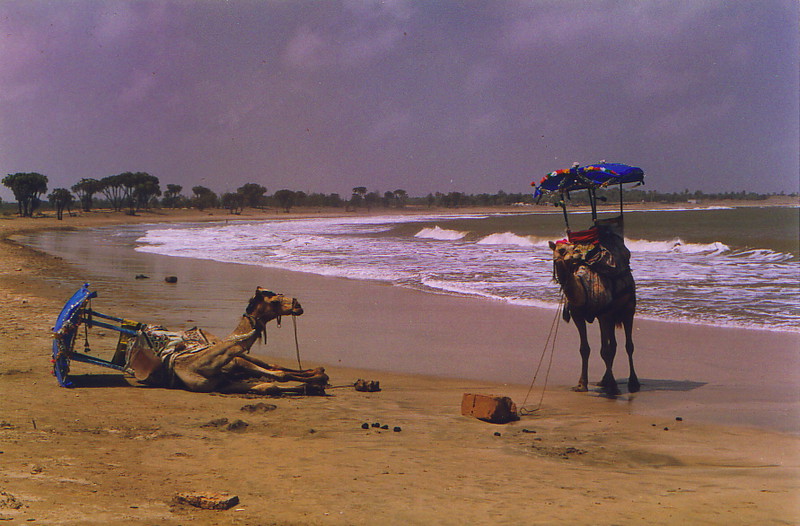
Following the cliffs to the south of the fort, you begin to understand just how easy to defend Diu must have been. The cliffs that line the southeastern coast are savagely beautiful with their pounding breakers spewing against overhangs and eerily moulded limestone formations. I was reminded of Victoria's coastline in Australia, but here the danger is not so much the cliffs as the sharp shelf of limestone sitting a few scant feet under the waves, waiting to smash the hulls of any invading ships. The cliffs form a natural barrier, with the double moat of the fortress a man-made equivalent. Between them they made sure that nobody got in... or out.
Diu's Churches
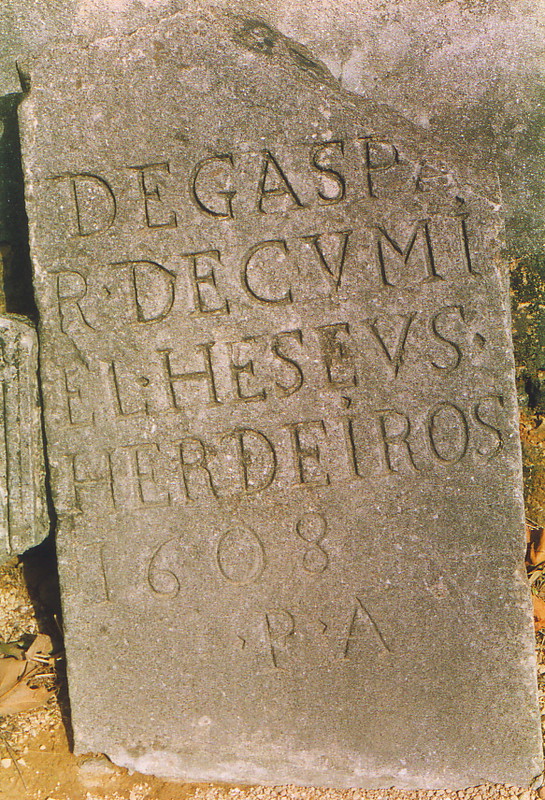
The cliffs are also home to a number of large caves dug into the ground; they're the remains of mines where the Portuguese cut out blocks of limestone with which to build their edifices. The fortress is just one of the colonial constructions on the island, most of the others being (of course) imposing houses of God. Three huge churches tower over the town's skyline, but only one of them is still used as a place of worship, and that sparingly. Once again, it smacks of frontier colonialism.
This church, St Paul's, is monstrous, and its state of decay is almost endearing. Still decorated lovingly with lights and statues of Christ, Mary and various members of the heavenly host, the church is attached to the local school.
I wandered in, deposited some change in the donation box (something I tend to do in foreign Christian churches, though I don't really know why) and took a look around, and out the back I discovered one of the most interesting notices I've ever seen in a church: the local price list for services.
Check out some of the following fees as set by Archbishop-Patriarch Raul Nicholau Gonsalves on .
| Church marriage | Rs50 |
| Church baptism | Rs20 |
| Blessing of a new house | Rs50 |
| Blessing of a foundation stone, small chapels or crosses, vehicles, wells, nets, stakes | Rs20 |
| Blessing of fields, new plants, corn, invocation against noxious animals etc. | Rs10 |
| Pealing of bells (each) | Re1 |
| Assistance at funeral service | Rs20 |
| Any religious service at the grave | Rs5 |
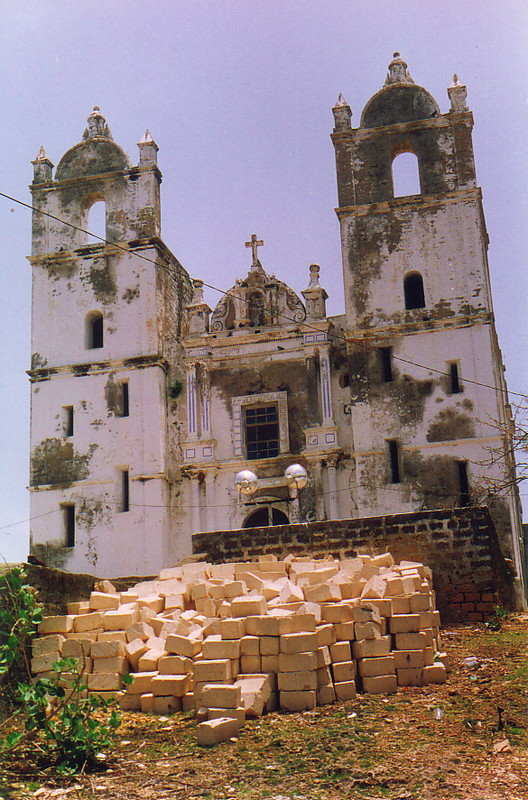
And tucked away at the end was this particularly Christian attitude, 'The poor will always be exempted partially or fully from the stipulated offerings/fees.'
Upstairs in the church was the school, deserted in the late afternoon heat. At one end of a corridor was a classroom scene so perfectly colonial you could be forgiven for believing it was set up specially for tourists, as the blackboard pronounced its algebraic message over a collection of tidy wooden school desks. To find an active Christian church in a windswept corner of such a remote Indian state was completely unexpected, but isn't that the clichéd image of colonial education? It felt as archaic and obsolete as Calcutta's Victoria Memorial or Melaka's Stadhuys, and just as magical.
More churches were waiting to be discovered as I headed off on a bicycle ride into the heart of the island, accompanied by a friendly Frenchman called Michel. Diu island is long and thin3, stretching west to east for about 14km, bloating to about 4km at its waist, and managing to rise to a maximum height of 29m above sea level; it's perfect for cycling. We explored Fudham Church (which holds one service per year, has no padre and is now a guest house inhabited by strange long-term travellers and humidity mould), Nagoa Beach (where most of the Indian holidaymakers hang out, the men swimming in their skimpy trunks and the women sheltering and sweltering in their sarees) and various rocky coves and honeymoon spots. In the high season Diu must be quite the place to be, but I was glad it was the off-season; it would be harder to imagine Diu as a frontier town with hordes of local tourists wandering around.
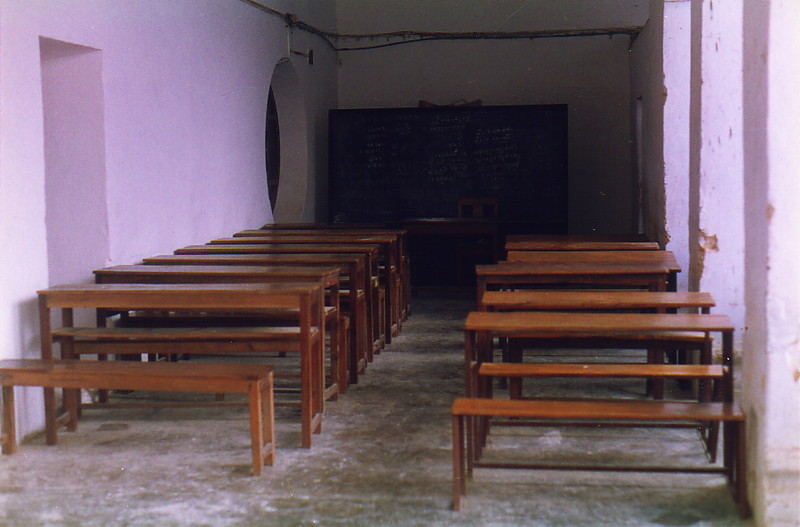
World Cup fever also struck as the games took off in Paris, and nursing a sore pair of buttocks from the bicycle trip4 I settled down to lose myself in the football, not so much because I like footy but because TV is simply fascinating after so long away from it. I watched France beat South Africa – memorable because the French coach was called A Jacquet and the South African coach P Troussier – and I settled down into a lifestyle of relaxation and spirited drinking. It was frontier living at its best.
But as with all frontiers, you have to turn around and go back eventually, so on the Sunday night I boarded the night bus for Ahmedabad, starting the long haul north back towards Delhi and my flight home.
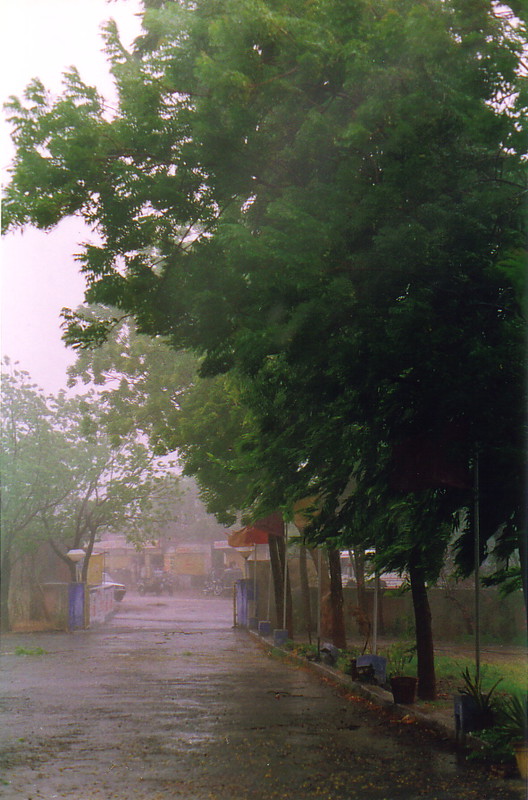
1 For an excellent description of how Operation Vijay played out in Diu, check out Operations at Diu: The One Day War by Group Captain Kapil Bhargava (Retd), which is based on the personal recollections of Group Captain Micky Blake VrC (Retd), with input from Air Marshal Mally Wollen PVSM VM (Retd). It's a very interesting read.
2 I was to discover later that a cyclone had been approaching Gujarat from the south in the Arabian Sea for two or three days, and had decided to hit the mainland on the day I was travelling to Diu. It smashed the west coast of Gujarat, causing severe damage to roads, power lines, water supplies and life expectancy; in total over 1500 people would die, not as much as the official heat wave death toll of 2383, but still sizable. The cyclone would also cancel my plans to visit western Gujarat, the worst-hit area, which is fairly out of the way and challenging to travel even without the after-effects of screaming winds and flooding. It was a blessing that I was ignorant of the weather conditions when I left Palitana, or I might have not bothered with Diu at all.
Indeed, the cyclone in Gujarat was still turning up dead bodies a week after its departure, and although I'm not for one minute trying to equate the simultaneous physical deterioration of my travel possessions with such an ecological and financial disaster, it's a coincidence that can't be ignored.
As winds battered the west coast of Gujarat, they also battered my Palitana to Diu bus, which in turn battered my bags. Soon after my arrival in Diu my trusty old Walkman started to sound muffled, and my even trustier computer started ignoring certain keys. Armed with a Swiss Army knife and the confidence inspired by a lack of any other solutions I tackled both of them one humid afternoon.
Inside my Walkman a tiny screw had worked loose, detaching the playback head; it was the work of minutes to fix it back in, even though it still sounded terrible. My computer wasn't so easy; designed to be as compact as possible, the Acorn Pocket Book was also designed to explode when opened up by Swiss Army knife. I'd seen the insides before, and soon tracked down a ribbon cable that had worked loose from its socket, but in the meantime I'd managed to attract a fair old crowd of Indian onlookers, all of whom were either genuinely interested, or drunk enough to find the magnetism of a crowd interesting in its own right.
Astonishingly, with the crowd leering over my shoulder, I did manage to fix my computer. I certainly deserved a drink after that...
3 This is quite unlike the inhabitants. Tourists and locals alike, everyone in Diu when I was there was fat. Beer bellies pushed shirt buttons to physical limits, sweat broke out quickly on even the most inactive brow, and fat middle-class drinkers ploughed through bottles of whisky, wine and beer at a rate that only the obese or the dedicated can manage. People don't come to Diu to get fat; they come here to get fatter.
4 'No leak, no leak,' said the man as I pointed out that my bike had a flat rear tyre. He pumped it full of air and promised me that it would be fine, which I didn't believe for one second. Nine kilometres away from Diu town and my teeth were rattling in my head as all the air shot out of my back tyre. My buttocks weren't designed to have a loosely padded razor blade inserted between the cheeks and shaken around for an hour, and they hurt. Still, what can you expect from an Indian bicycle?